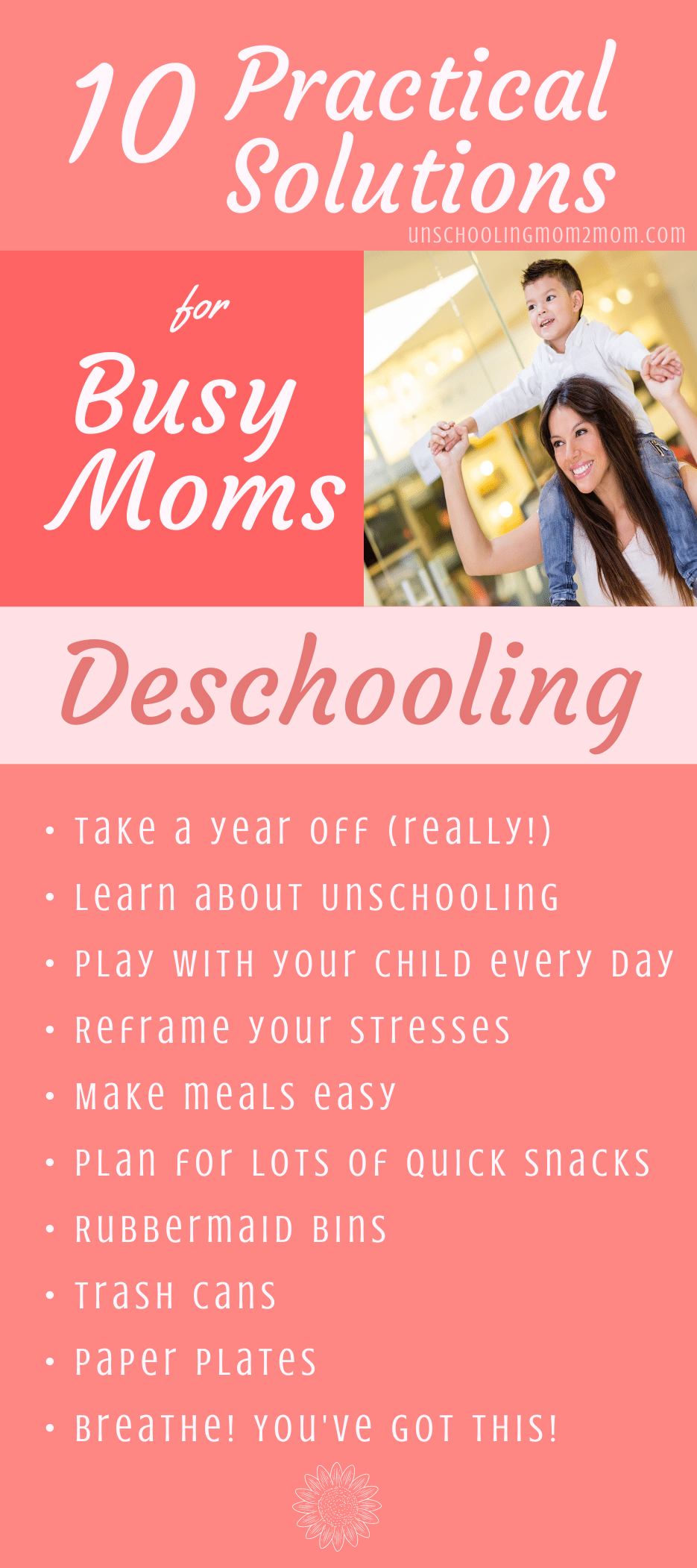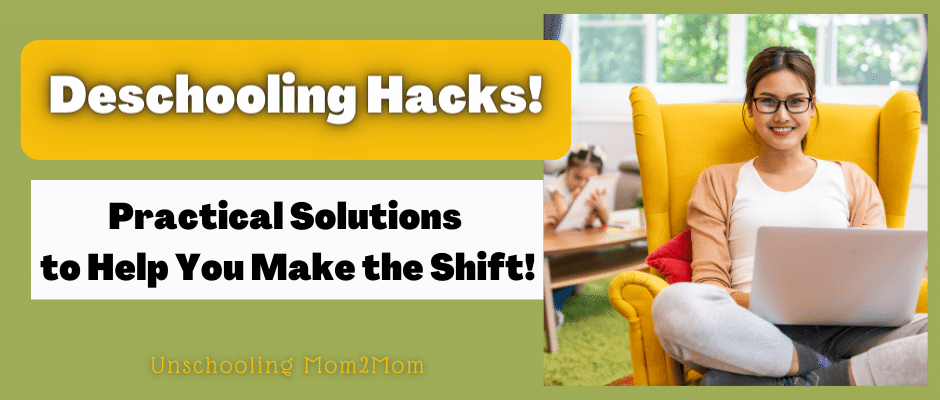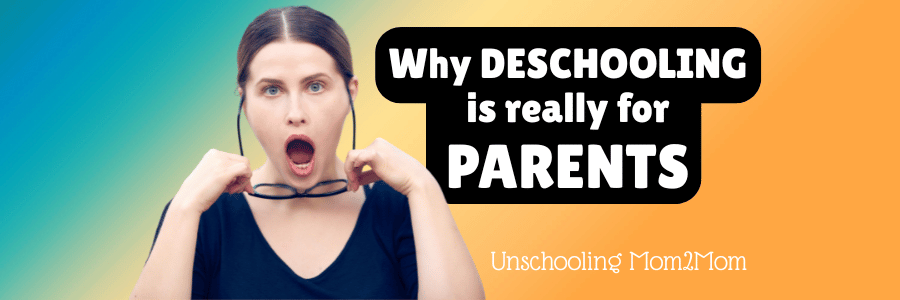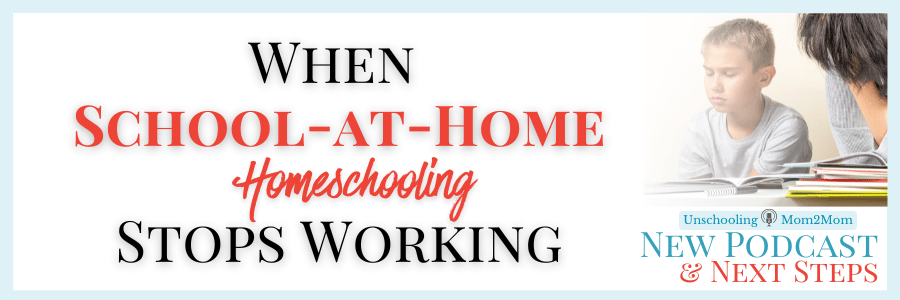Deschooling Hacks from Unschoolers
Over the years, I've been collecting ideas to help unschooling families.
Turns out, there are actually some HACKS to help the deschooling process go smoothly!
- Remember, it's all trial and error from this point forward.
- Think of everything as "an experiment."
- Keep what works and disregard the rest.
Quick caveat: Sometimes what doesn't work RIGHT NOW, may work down the road. So don't throw the idea ALL THE WAY out... just tuck it aside in a "Maybe Later" file. 😉
1. Take a Year Off
Don't look at curriculum for one year. At least. By stepping away from the school approach to learning, you'll be able to SEE the learning that's happening without you organizing it all. Pushing a lot of educational material, because you haven't figured out unschooling yet often becomes a waste of money. The kids probably won't retain much of it anyway. If you skip the school focus, it will allow you space and energy to create full rich lives for your family.
Create your own DIY Unschooling Plan by reading, watching, and listening to information about unschooling and deschooling. Spend this year doing your own self study - I have so much information here to walk you through. Even more in the Creating Confidence Membership, if you'd like more hand-holding!
2. Tune Into the Kids
Pay attention to each child a little bit every day. What do they ENJOY? Do that with them. Think about how you LOVE them... how fortunate you all are to be together. Choose to focus on the love instead of the fear.
Spend the time connecting with your children on a new level. If they've been in school, they probably need some decompression time. They really need to see that you're on their side and will be there to partner with them through all these changes.
Notice when you want to rush through to get to something you value, but maybe they don't. There's no rush. No "Educational Emergencies!" Spend a lot of time observing, noticing tendencies and preferences. All of this will be helpful data along this unschooling path.
🎙️ Podcasts/Blogposts:
When All They Want to Do is Play
Unschooling and Playtime
3. Interests Over Subjects
Subjects actually weave throughout all of the kids' interests. And, usually more than one! If you focus on your kids' interests INSTEAD of subjects, they'll learn so much more. True, it will not be in the standardized way that schools approach education, but you're no longer limited to that one-size-fits-all approach for your child. They'll get what they need as time progresses. Use this deschooling time to help your child find resources to help them explore their interests more... maybe that will be out in the community, online, in documentaries - the sky's the limit!
Read this: Everything Counts!
4. Build Your Own Foundation
Deschooling is a marathon - not a sprint!
Don't expect to read a couple of blogposts and have a complete transformation.
When you start with this idea though, your expectations stay more realistic.
You have had a lot of years of conditioning - it's going to take a while to undo all of that.
But just like training for a marathon - or any kind of change you'd like to see in your life - it helps to create a strategy!
- Plan to read (listen to a podcast or
watch a video) about unschooling or deschooling a little every day. Schedule it for yourself.
- Connect with your child a little every day. Not with an agenda to move them through, but what's going on with them today?
- Work your way through this list of deschooling hacks.
5. Deal with the Clutter
Get large plastic tubs for each kid. As you find shoes or stuff that have been left out, you can easily drop it into their tub so you're not all tripping over boots or toys. This makes it easier for them to take their stuff to whatever place has been designated for them - or at least it will be easier to find them when everyone is rushing to get out the door

6. Set Up for Success
Along those same lines, add small-ish trash cans to every room. Remember that the house is going to get messy.
Kids LIVE there 24/7!
- Make space for plenty of flat surfaces - projects need places to live! It's hard to quickly dismantle something you spent a lot of time on - which has to happen if you use the dining room table and you need to clear it for dinner! A separate spot for projects to dry or enjoy, can save a lot of power struggles and disappointment!
- Find ways to put projects up higher on shelves if younger siblings are running around. 😉
- Make sure you have CONVENIENT ways to dispose of all those craft scraps, wrappers, or any kind of litter - this will help a lot. When kids are home exploring and learning, projects can get messy. Instead of dreading them, plan for easy clean-up.
Read this: My House is a Mess!
7. Food/Meal Strategies
Simplifying and planning are key.
- Crock-pots and Instant Pots can free up a lot of time. The more you plan out, the less time you'll have to spend in the kitchen. Show the kids how to use the microwave to pop their own popcorn - or even air-fry their own nuggets! Not only will this free up some time for you, but they'll learn some independent life skills.
- If you're someone who loves cooking, go ahead and plan for it. That's a fun thing to include the kids on (some simple aspect) or maybe just the smell of something wonderful baking will trigger all kinds of warm fuzzy feelings. So many good things from that!
- Save time and energy by cutting/prepping fruits and veggies. Keep healthy snacks accessible in refrigerator drawers and lower shelves of pantry.
- Minimize the dishes! Use paper plates and talk to the kids about using one cup or water bottle all day. You could even use a sharpie on a plastic cup to help identify who's cup is whose. Ask everyone to wash the food off their silverware so it won't be so hard to clean. Some will do it, others will forget. If they do it a little, it's a little help.
- Remember that everyone gets crabby if they're hungry. What's something quick that can rescue a situation spiraling in the wrong direction?

8. Mindset Matters
Let's face it, when we ship the kids off to school, we don't have to parent nearly as many hours. So when we bring them home to learn, we may have to work on some of our own parenting skills. Most of us could use help with this - especially if our goal is to unschool! Read more about attachment parenting and styles of parenting where the relationship is the priority. Creating strong bonds between you and your kids will actually give you insight into unschooling your child. You'll be able to see what they need and any resources that you could help them access. The more they trust you, the more they'll thrive!
We will have days that don't go right. We will have days we feel exhausted. Learning how to cope is an important life skill for us!
Sometimes it helps to surround yourself with other parents who are on this same path - especially when you can access someone with grown unschoolers and nearly 30 years of experience. Find out more about joining Sue Patterson's coaching group here:
10. Breathe.
You can do this. 💛
I know that we're often last on the list when it comes to our own self care. But sometimes that's because we think it has to be huge to really rejuvenate us fully. But little opportunities pop up for 3 minute deep breathing techniques or morning meditations. Even just taking 10 minutes to enjoy a cup of tea and watch the birds at the bird feeder. It can do wonders!












